Events & Promotions
| Last visit was: 23 Apr 2024, 11:52 |
It is currently 23 Apr 2024, 11:52 |

Customized
for You
Track
Your Progress
Practice
Pays
09:55 AM PDT
-11:00 AM PDT
10:00 AM EDT
-10:30 AM EDT
10:00 AM PDT
-11:00 AM PDT
02:00 PM EDT
-03:00 PM EDT
03:00 PM PDT
-04:00 PM PDT
07:00 PM PDT
-08:00 PM PDT

| FROM MBA Data Guru: McKinsey Emerging Scholars |
|
McKinsey Emerging Scholars For all of you soon to be MBA Students interested in consulting, McKinsey has a great opportunity for you. Apply for the McKinsey Emerging Scholars program by May 19th 2016. If you are selected to be a scholar, then you will receive a monetary award, mentorship from McKinsey consultants and an invitation to a celebratory event. In order to be eligible, you need to be a full-time MBA student that is starting in the Fall of 2016 from one of the following 16 schools:
MBA Data Guru - Business school admissions data and analysis |

| FROM DLo's BSchool Debrief: b-school debrief: intro |
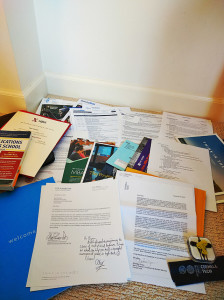 Well well, a new project! Since my previous effort didn’t stick, I’ve decided to move on to a new focus. The previous one (Precisely 603) was actually just an effort to keep my writing and introspective thinking fresh for the purpose of having a sharp pencil when it came time for b-school essays. It was just part of the activities that would engulf most of my 2015. I didn’t keep it a secret, but I didn’t air it out publicly: I was applying to business school. Anyone that’s familiar with the process or has witnessed anyone else go through it knows that the application is pretty damn involved. Experts recommend polishing your credentials and working on yourself 1-2 years ahead of time to even have a leg to stand on when you hit that “SUBMIT” button. Personally, business school had been on my map since my first year as an engineer at Raytheon; sparing the details, I joined their leadership rotation program, which threw me across business units and roles that helped me understand the ins and outs of how the company itself functioned outside of my schematics and lab equipment. I knew I wanted a larger role in all of this. A few years later, when it came time to seriously work on the application, I realized just how much it would involve. I had applied to grad school before, and that only required me to take the GRE, write a two-page ‘personal statement’ copy-and-pasted for each school, fill out my academic credentials and cross my fingers. It took only a few months from deciding I wanted to go get an MS to when I had my UCLA acceptance letter in my hand. While applying to grad school was not easy, b-school was a whole different beast. I spent more than 2 years on the entire process, from opening my first GMAT book to getting the last of five decisions from schools. As I recount the journey in my head and occasionally on the gmatclub.com forums, I find myself excited to tell parts of my story. And so here we are, at the start of something I hope can act as both an explanation of this struggle and its effects on both my professional trajectory and personal life, as well as serve as a guide for anyone about to embark on or currently amidst the chaotic battle that is the business school application. What I hope to cover in the next several entries (and I’m not going to put a timeline on it this time for fear of dropping the ball again like my last project) are: 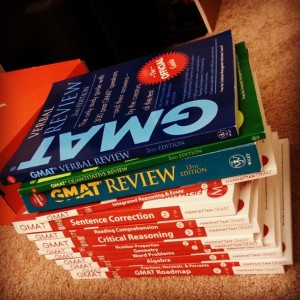 - The GMAT - Costs of the process - School research and targeting - Self research and reflection - Putting in the legwork at schools - Writing those damn essays - Destroying those damn essays - Re-writing those damn essays - Putting the apps together - Hitting Submit - Waiting in agony - Interviews (or not) - Waiting in more agony - Decision time I may or may not structure it as above, but we’ll see. I’m really excited to have gotten to where I am now, with a promising and new future ahead (hopefully) and am eager to share this whole process that I poured hours, weeks, months, and years of my life into. Hope you enjoy (if anyone does end up reading these). Until then! |

| FROM DLo's BSchool Debrief: b-school debrief: the GMAT – part 1 |
|
https://blog.ryandumlao.com/wp-content/uploads/2016/05/IMG_20130807_232118.jpgThe GMAT is the biggest point of worry for most aspiring applicants, and with good reason. It’s another standardized test when most of us were ready to be done with them forever, having suffered through them since elementary school. It’s more complex than the SAT, and in my opinion harder than the GRE (granted, I took the GRE in 2008, two large revisions and scoring systems ago), especially for quant. It’s getting increasingly more competitive as well, with a 700+ score no longer being your champion stat to get you into the top 20. In The Beginning I started studying for the GMAT in 2013 as a “if you’re doing it, hell I’ll do it too” with another friend. We were both considering b-school, albeit for different paths given that I am an engineer and he was at the time a federal agent for the IRS (you know who you are). I picked up the 2013 Official Guide, or the OG as Manhattan GMAT likes to refer to it, and took the diagnostic test in the first chapter cold-turkey. I found that, 5 years past my GRE, I was absolutely terrible at quant; this was incredibly dismaying considering I was an engineer sitting on an MS in solid-state electronics, with my favorite grad class having been quantum mechanics. But the GMAT thinks differently, challenges you far more than “I know one way to solve it,” and forces you to problem-solve at a pace only the most frantic, high-stakes day trader could probably fathom. And on completely useless math properties that, regardless of how much math you know, really boil down to how quickly you can recognize patterns. GMAT At Its Core  Patterns is all it is. That’s why you have people that are just naturally good at standardized tests; they can recognize the patterns that the GMAC uses to build these questions. Once you begin to recognize the patterns in these questions, you can couple that with knowledge of the basic GMAT math principles, time-saving strategies and most importantly your ability to rationalize when you should say “eff it” and move on to the next question, and keep pushing. Of course, that only covers quant. You’ll notice a quant-heavy focus on this series, because that’s what I really had to work on for this test; oddly, verbal was far easier for me, probably because GMAT verbal is very logic- and rule-based analysis. But this blog isn’t meant to give you foolproof GMAT strategies for specific problems, or present the best way to score 790 or anything like that, because there are hundreds of better sites and resources for that, like peer sites such as GMAT Club and prep resources / courses like Manhattan GMAT. I’ll just lay out here what I did to get through the process successfully, with small tips along the way. For starters, I took the test twice. I scored a 640 the first time and I was crushed. But two months later I jumped back into a Pearson VUE cubicle and hammered out a 710. So if you’re looking for an uplifting story to help calm your nerves after a bad first-take or initial diagnostic/mock/CAT test, you’re in the right place! The Resources  So, back to my story. After studying a few months in 2013 using the OG book and a full set of Manhattan GMAT books, I got a new job and moved from LA to SF, putting my test aspirations on hold. I hadn’t truly dedicated myself, putting in maybe 4-5 hours per week after work, making my way through the Manhattan book strategies and taking a diagnostic at the end placing me at ~650. While this wasn’t what I wanted, I also was half-assing it and this period really just served to introduce me to the structure of the test, the types of questions and material I needed to know. A year later, I started hitting a turning point at work and decided I was still going to go through with my b-school plans. I picked up my Manhattan books again. Based on their strategies and feedback from others, I was convinced the Manhattan resources were going to be my route. And then I got incredibly lucky. A co-worker at my old job had taken the full in-class Manhattan GMAT course, and her membership was still active for the online portal, which included three great resources: 1. Online CAT tests 2. Video recordings of each course in their 9-week course 3. The GMAT Navigator tool companion for the OG book It’s at this point where I can’t say you can do it all for free. I set out from the start to be as low-cost as possible, and I very luckily (but definitely not kosherly) had free access to otherwise paid resources. However, of those 3 items, you can really do #1 and #2 without the course. 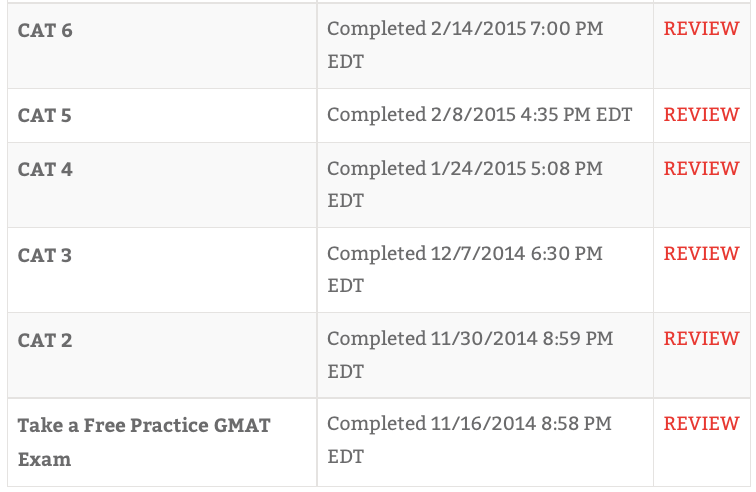 The first one is the Online CAT tests, which were absolutely crucial to fine-tuning my study strategy, ESPECIALLY after my first unsuccessful go-around with the GMAT. I’ll cover more how to utilize these tests to their full advantage in Part 2. You get access to these with the purchase of ANY one Manhattan GMAT book. If you buy the full set, you have 9 codes, which you can give to your friends if you’re particularly generous and like to pay-it-forward, a key trait for b-school anyway. For #2, the reality is that everything in the video lectures is more or less contained within the Manhattan GMAT books, but requires a bit more diligence and dedication to understand, maximize and stick in your head. If money is not an issue for you, I highly recommend the Manhattan GMAT course (or do what I did and luck into someone else’s still-active account, but no, don’t do that, because that’s against their rules). Otherwise, you’ll still be OK. Pause This is getting long, so I’ll cut it here. In the next post (Part 2), I’ll touch on how I applied the use of the resources above and other strategies to study effectively. Work hard! |

| FROM MBAble: Why I gave up on the GMAT |
|
I spent a good chunk of yesterday binge-watching installments of “Handicapping Your MBA Odds” that John Byrne from Poets and Quants and Sandy Kreisberg with HBS Guru host (side note: it’s a nice series to watch to get some directional insight on a diverse selection of aspiring MBA’s and where their profiles may put them in top B-school candidate pools). One recurring theme I found in their discussions is that if you want strong positioning for the cream-of-the-crop programs (e.g. Harvard, Stanford, Wharton, etc.), a score in the low 700s isn’t enough. In fact, you would ideally want to target at least a 730 score with extra weight on the quant section. And yet, here I am. Someone who couldn’t even break the 700 threshold on the GMAT and is an aspiring Boothie (albeit for the part-time program, which is a completely different ball game from full-time admissions). At some point after I took my fourth GMAT, I heard a wise AdCom member for a top MBA program say that if you’ve taken the GMAT three or four times already and your score hasn’t changed much, then it’s time to lay that part of your application to rest and focus on getting the rest of it done. This made a lot of sense to me. I mean, just look at my GMAT history: Year Score Notes December 2013 440 Blech! Unspeakable. November 2014 610 After Manhattan GMAT prep course. December 2014 630 No change in V. Boost in Q. December 2015 660 No change in Q. 96th percentile in V. Over the course of 2 years and $1,000 in fees, I finished with a mediocre GMAT score that, as some form of consolation, put me on the low end of the middle 80% of scores for my desired program. What really influenced me to stop trying was that I was hitting some diminishing returns in my studying efforts. Between exams, I took plenty of practice tests as a diagnostic tool and saw that by mid-2015, I was plateauing at the 670-700 range. That said, it was no surprise to me that I scored how I did in my last test…but it was still super disappointing.  But when I look back to conversations with admissions at Booth, I didn’t really have a reason to be as down as I was on myself. After my December 2014 GMAT, I voiced my concerns to the previous admissions rep, and she said I could retake if I wanted to but that I should still give an application a shot. Needless to say, I didn’t have the confidence then to move forward. A year later, I was on the phone with the new admissions rep, this time about my 660. Similarly, he reinforced that Booth reviews applications holistically and that my score was not necessarily in itself a deal breaker. Five months later, I’m just waiting to hear back. Nevertheless, as MBA applicants, it’s drilled into our heads that we need to cover for our weaknesses, so I decided to shift my attention toward beefing up my “alternative transcript.” More on the latter for a later post. Hopefully I can look back on this post and smile since I got in. Or at the very least, maybe it can serve is some sort of catharsis for you that there are lower GMAT scores that yours in the MBA application universe. Cheers! Durian P.S. In all likelihood, I will be taking the GMAT again sometime later this year if my Fall 2016 cycle applications don’t plan out. Hehe. (added 5/26) |

| FROM MBAble: Another App In |
|
Yes, I am happy to report today that as of last night, I have cranked out and submitted my fourth application in a month! Except, it wasn’t an MBA or grad school application. Yesterday, I sent in package to apply for the Sundance New Voices YouTube Lab (part of Sundance’s episodic storytelling institute). I had been eyeing sending an application in for Sundance for a long time. In fact since 2014, I’ve been thinking about applying for their Asian-American Feature Film Fellowship, but I never thought I had substantive enough work to send through for consideration — I actually still feel that way. Even this time around, it took a lot of convincing and aggressive talking-myself-into-applying to take action. Good news for me that Sundance kept extending the deadline from March 27 at 6 p.m. PST to April 25 at 6 p.m. PST to May 25 6 p.m. PST before bumping that up to 11:59 p.m. What It Took From the moment I found out about the opportunity to the day I decided to crack down on applying, my mind bounced around like a pinball between reviving an old idea or draft to writing something completely new to just not applying at all. For extended periods of time, I seriously considered sticking with the third option but managed to successfully talk myself out of that when I realized I had no choice. Or at least, no choice was what I deserved to give myself. I had pretty much put my creative writing on hold 2009-2014. That’s FIVE YEARS. Five years too many. After wowing myself with substantial workings of a manuscript in November 2014, I became hungry for more. I tried to write full-time April 2015-July 2015 — July being when I went back to the full-time working world because I thought that’s what I wanted. But then that last workplace and I mutually realized this past March that it wasn’t. And so here I am. Treating writing like it’s the only thing I can do. This way, I can either get the urge out of my system faster or realize this is my grand old calling in life. What about the MBA? I still believe that an MBA has a place in my life. In writing classes, I have found that many of my peers who are writers by trade and training are amazed by how the “9-5 Corporate American” lens I am able to view the world by is able to bleed its way into my writing. That said, I think that the business perspective is important to represent in fictional writing even in all its mundane-ness because it’s real. Not to mention, the demands to getting work as an independent creative these days calls upon functional knowledge of managing a brand. But that’s a topic that deserves greater focus for another post. Not to mention I’ll be talking more about creatives with professional degrees tomorrow. So that’s that. Just thought I’d share. Cheers! Durian |

| FROM MBAble: Creative Types and the MBA (and other professional degrees) |
|
Last year when I attended a session of Chicago’s Booth Live, I felt pretty out of place. I was surrounded by professionals from all over the world from major corporations, big banks, leading consulting firms, and the like. Then there was me. A newly “unemployed” member of society, who was spending most of her time working on pitching a sci-fi novel and informally consulting with start-ups (did I mention all of that unpaid?). So this is how I introduced myself: “Hi, I’m Durian. I’m pitching a novel, doing a little work with start-ups. I want to get an MBA to help me get into HR.” Yet where I was professionally at the time made me feel extremely insecure. I even asked myself, “What’s the point in even trying for a Booth MBA if the school won’t even want me?” So to get the proverbial sign I was hoping for, I asked an admissions rep what AdCom thought of candidates like me, who chose being heads down in creative work in favor of holding down a standard 9-to-5. “Actually,” he tells me, “we have a musician enrolled right now who took a break from touring to get an MBA.” I know this is nothing particularly new or that unusual—I mean, take a look at Pete Mathias and Johnny Mathias from Filligar, who are both wrapping up their time at Tuck. But hearing straight from the horse’s mouth that I still stood a chance was just the dose of hope I needed to keep going. Professional Degrees and Creative Work Being a Russian literature geek, I’m no stranger to people who have continued to do or have gone on to do creative work after getting an unrelated professional degree. Anton Chekhov and Mikhail Bulgakov are best known for being prominent Russian writers around the time of the revolution, but were also practicing physicians. In a more recent example, take Neal Baer. He is a pediatrician and also a Hollywood TV writer, producer and showrunner. He is probably best known for his credits in “ER” and “Under the Dome.” For the three, their medical backgrounds were apparent in their works. Chekhov was known to have physician characters in his stories and demonstrated a doctor’s sensibility in the discussion of characters’ conditions. Bulgakov documented (with creative liberties) his experiences treating venereal disease in his early days practicing that were later compiled and published as A Country Doctor’s Notebook. And there’s no way that Baer’s perspective from on-the-job didn’t make its way into his “ER” writing. But what about MBA’s? I’ll focus on Booth people since I’m an aspiring Boothie, you know that. I stumbled across a couple of articles, one about an author and one about an artist, who each got their MBA’s at Booth. Oh, did I mention they are both women? Woohoo! The author is Sara Paretsky. She is best known for writing detective fiction, particularly her series with a norm-defying female sleuth lead. In an article from Booth Magazine, she talks about how an MBA was beneficial to her in ways such as:
Both of those former Boothies demonstrate their business acumen through the way to go about their artistic pursuits, whether it’s in the way they do business or as a perspective that makes its way into their works. So for me… I can definitely see an MBA being of great service as I build my brand as a writer. Also down the road, I want to work on a non-profit venture that brings together leading authors/writers/content creators to teach free master classes to underprivileged youth with a passion for storytelling. And as I mentioned in yesterday’s post, as someone with a corporate background, I do find that my experiences in the business world make their way into my writing. Heck, a marketing internship is central to the manuscript I’m pitching around, in a similar way that architecture is a central component of architect Charles Belfoure’s The Paris Architect. It is also very likely that I’ll pick back up on the 9-5 work and continue to write on the side. So, MBA, please help me there… Cheers! Durian (depicted: my screenwriting, songwriting, fashion drawing, and GMAT prepping endeavors) |
| FROM Tech MBA Girl: Final Decisions – New Direction |
|
Final decisions are in: Berkeley: Denied with interview Tepper: Waitlisted with interview Rotman: Admitted with scholarship (withdrawn) Random French School: Admitted to MSc in Management with scholarship (matriculating…maybe) It’s been eight months since I started my MBA admissions journey and I’ve learnt so much thus far. I am glad I tried for schools beyond my … Continue reading Final Decisions – New Direction → |

| FROM MBAble: Taking a B-School Class as a Non-MBA Student |
|
For the last few days, I’ve had my head down at my computer, cranking out my share of a group paper that will be submitted as each member’s final graded assignment for a class I’m taking at Booth School of Business. It’s worth noting that I’m not an MBA student there…yet. I’m one of those MBA applicants who embarked on assembling an alternative transcript for their application package. In my case, my problem wasn’t so much that my undergraduate GPA was inadequate. On the contrary, my low GMAT score (weighed down by the quant section; check my blog’s right rail) was the problem. After having figured that out mid-last year, I hunkered down to figure out what I could do to mitigate this weakness. One of my first moves was to take a calculus class at my local community college because despite being a stereotypical Asian (I’m Filipino) being an economics major in undergrad, I was able to successfully circumvent having to take that class. This is a red flag for a top MBA application when you think about how a fundamental course like microeconomics comes with a prerequisite of having a working knowledge of calculus. So beginning last May I found myself grinding my way through derivatives and integrals for eight intense weeks in Calculus I, and I somehow made it out alive with a B in the class. I also applied for the University of Chicago Graham School’s Graduate Student-at-Large program (NOTE: for MBA seekers, GSALB may be more appropriate for you — I have some wide-ranging academic interests and wanted flexibility to take coursework across colleges, which is why I did plain old GSAL). With me being me, I stalled until the last reasonable quarter I could take a class to be considered for my Fall 2016 application at Booth (in my defense, I went through some serious job transitions for much of last year), which is how I ended up enrolled in a class this spring. I won’t say the name of my class, but it’s a soft-skills/organizational behavior type of course. Now typically, prospective MBA students are advised to choose a quant-heavy class under the fundamentals umbrella (think statistics, economics, accounting, etc.). BUT after reading a syllabus for the class I’m currently taking, I knew that 1) it posed a reasonable challenge and 2) I could pick up some useful skills I could quickly take action on in my professional life — honestly, even my personal life. While I’m pretty sure my calculus class will help my case, I do find it doubtful that the soft-skills class will give me that many brownie points as AdCom considers my application. However, I have been contacted by Booth admissions in which they stated that they need to see my final grade in the class before closing my file and delivering a final decision for the coming school year. Pretty much all of me believes that the follow-up just speaks to a technicality (i.e. AdCom cannot physically push the button in the application management system UI to send a final decision until a transcript with the grade is received and attached). Nevertheless, I still see a glimmer of hope that a “yes” may be just around the corner. Cheers! Durian |

| FROM FINAL HOUR MBA: Leaving the Doldrums |
|
This is more of a personal post. But it’s needed to get me back to blogging about the MBA journey. I am finally writing about the one thing that’s been on my mind since submitting my applications. I couldn’t put a finger on it until today. Since I hit submit on my las application I’ve been in this sort of frozen zone. I couldn’t move, couldn’t think, couldn’t make a plan for the future. I called it the doldrums because it reminded me of something I read many years ago. A vivid scene in a book where the main character was stuck in a similar place as me. Thanks to the modern technology that is Google I was able to put a name to the book. It’s The Phantom Tollbooth by Norton Juster. As a child I don’t think I really caught on to the main themes of this book. I’ll probably reread it at some point since I am going back to school. It might be a good break from management thoughts and theory. But enough about the book. The struggle is real. People will often talk about the stress of applications. Sure the GMAT is tough and writing those essays takes a lot of thought. But the worst part is the waiting game. Especially if you get stuck on the waitlist. You begin to ask yourself if you did enough. Did I write a strong essay? Were my interviews on point? What could I improve? Why don’t they like me?? Hopefully someone writes a blog post on how MBA admissions is like dating. Are first impressions truly everything? Even though I was rejected from most of the schools I applied to I am still in the same place. I have been accepted to Notre Dame, a great MBA program. I was waitlisted at Carnegie Mellon, Texas, and USC. Each of these schools have more to offer me than Notre Dame (or so I think) since my post-MBA plans involve tech and startups and coming back to the Bay Area. It feels like I can’t do anything or even talk to people until I know for sure where I am going. Sitting on the waitlist continues the journey through the Doldrums. I have decided to force myself out of waiting. Self-doubt does nothing for the situation. It’s not a good trait for MBAs so I am eliminating it. Hopefully someone can apply this mindset for whatever their situation may be. The school decisions are pretty much out of my hands. I did my best and followed up They know I want them and they need me. There are a lot of things to do prior to my MBA that I can focus on. I want to work on my social media presence. I also want to work on coding/PM/app development. I will hopefully have a mobile app put together and published before I leave for school in early August. Last but not least I want to keep exercising, networking, and practicing my communication skills. These, more than anything will help me succeed in business school and beyond. First impressions are very important after all. The takeaway is that you are not stuck. There is a plenty to work on. Just start with one simple step. In my case it was a blog post. Yours may be a trip to the beach or finally going to that Meetup you’ve had your eyes on for months. Best of luck! |

| FROM MBA Data Guru: INSEAD Acceptance Rate |
INSEAD Acceptance Rate This article will analyze the model I built to predict INSEAD acceptance rate. INSEAD is a graduate business school in France, near Paris. It has two additional campuses in Singapore and Abu Dhabi. In addition to the MBA program, INSEAD also has an Executive MBA, Masters in Finance and a PHD in Management. Unlike most business schools in the US, INSEAD’s full-time program only offers a 1-year MBA. INSEAD students can either start in September or January. The January start is a 12-month program for students who would like to do an internship. The September start is a 10-month program. INSEAD prides itself on being a global business school, thus, it requires applicants to speak two languages fluently before being admitted. In order for a student to graduate, they must speak three languages. On average, INSEAD MBA acceptance rate is 31%. The average GMAT is 703 and the average GPA is 3.5. INSEAD Acceptance Rate by Starting Semester 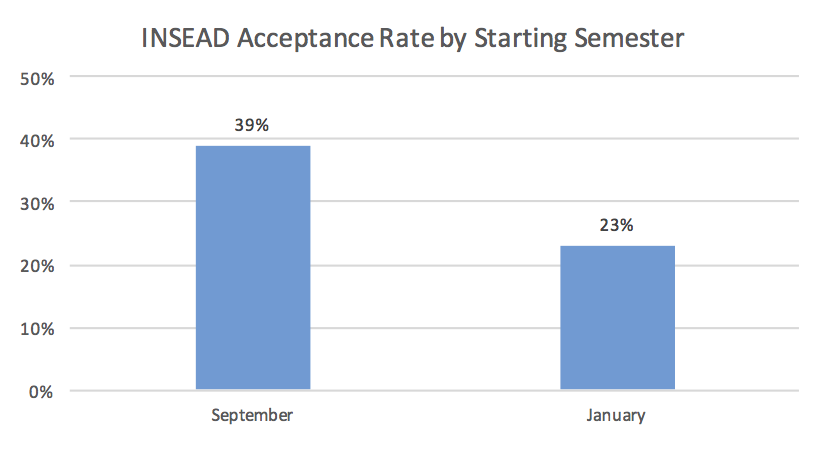 Similar to Columbia, INSEAD has two start options. Since many MBAs are hoping to use their MBA to transition into a new industry, there is much more competition for the January start because it allows for an internship during the summer. Since fewer people apply for the September starting semester, their chance of admission is 70% higher than that of the January applicants. September INSEAD applicants have a 39% acceptance rate compared to only 23% for January applicants. INSEAD Acceptance Rate by GMAT 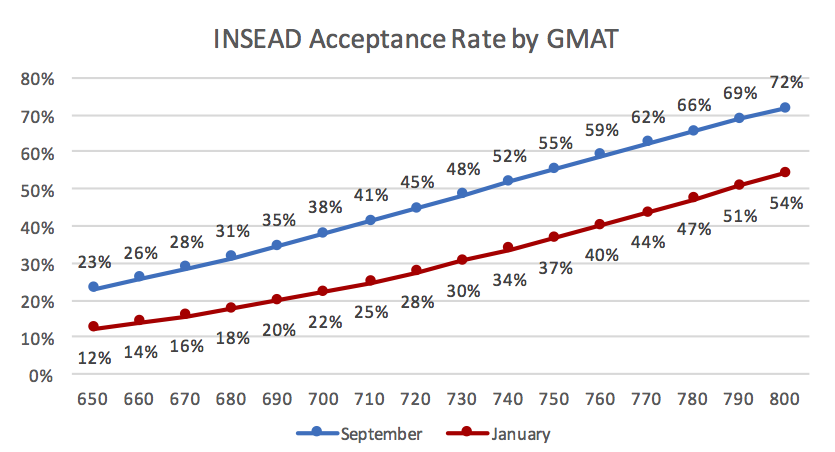 GMAT has a large impact on an applicant’s chance of admission at INSEAD. It is especially important for those applying for January. A 100-point increase from 650 to 750 would raise January acceptance rate from 12% to 37%, which is a 208% increase in chance of admission. A similar increase in GMAT for a September applicant would only increase chance of admission by 140%. INSEAD Acceptance Rate by GPA 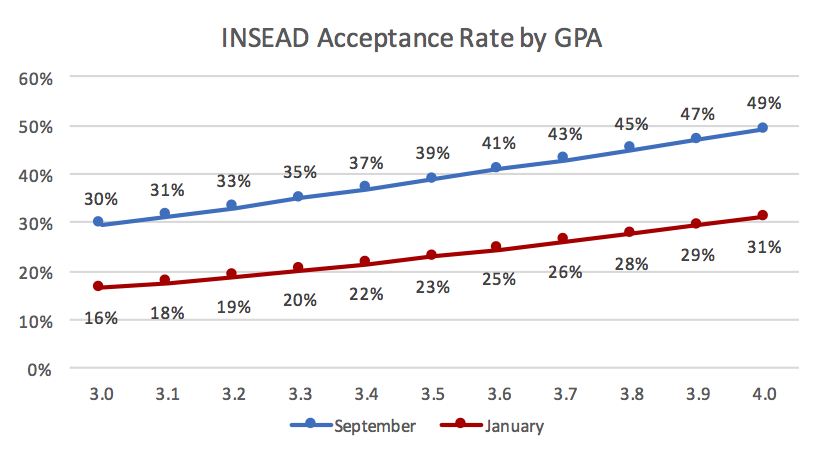 A high GPA can increase your odds of getting into INSEAD. Both start semesters get a healthy boost in chance of admission from a high GPA. Interestingly, a January applicant with a 4.0 has a similar acceptance rate, at 30%, as a September applicant with a 3.0. INSEAD Acceptance Rate: GMAT vs. GPA 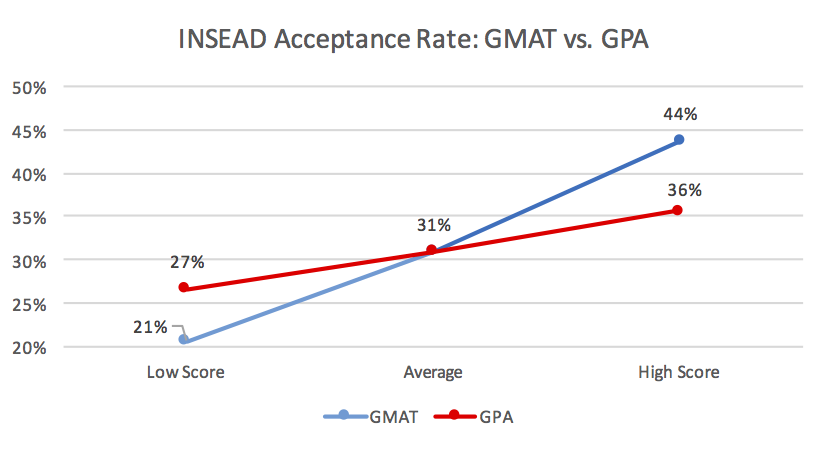 Although both GMAT and GPA are both important for admission into INSEAD, GMAT is more important. Getting a high GPA (one standard deviation above average) will increase chance of admission 5%. However, a high GMAT will increase your chance of admission by 13%. INSEAD Acceptance Rate by Geography 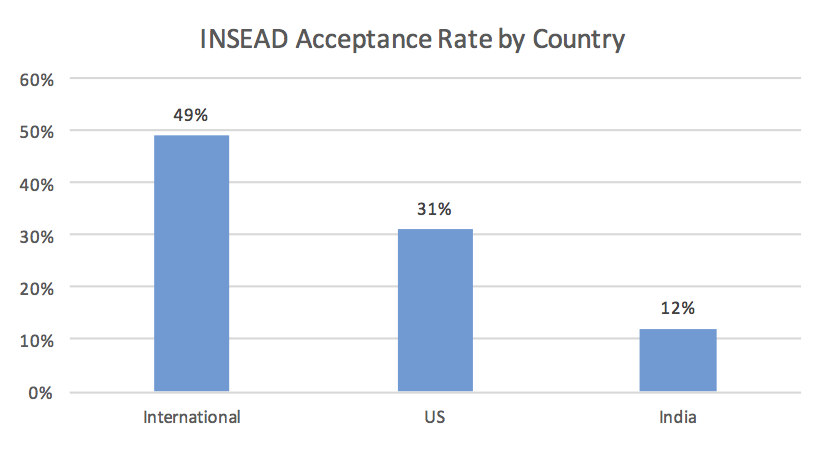 Citizenship has a significant impact on INSEAD acceptance rate. Indian applicants face tough competition for a spot as an MBA student at INSEAD. Indian applicants have an acceptance rate of only 12%. Admission to INSEAD is much easier for Americans, with an average acceptance rate of 31%. No other country had enough applicants to be statistically significant, so I grouped all other countries into the category of “International”, which had an acceptance rate of 49%. The data I used to create the INSEAD model came from GMAT Club. MBA Data Guru - Business school admissions data and analysis |

| FROM BschoolEng: GRE vs GMAT |
|
My last blog post highlights my experience taking both the GRE and the GMAT. I would advise people who feel like they didn’t do well or at least meet their expectations on one test to try the other. Each test tests different skill sets of an individual. I’m assuming that you are here because you are interested in applying to bschool and the first test that you would probably think of is the GMAT, the more commonly used of the two when applying. For me, the quantitative was not the hard part. It was the verbal so when comparing the two tests, I looked at which one catered more towards my strengths. Whereas the GMAT has a critical reasoning section, the GRE has vocabulary. I knew memorization was not an issue for me so this fact alone was the sole reason why I decided to take the GRE. If you commit yourself to studying a set of vocabulary words every single day, you’ll do just fine. My studying plan to conquering this was simple:
As far as the math section goes, the downside to taking the GRE is that it is somewhat expected to get a perfect score. Because there are so many international students taking the GRE and you’re competing against them when it comes to calculating the percentile, anything short of a perfect score will bring it down. The one thing I recommend when it comes to tackling the quantitative section is to take your time. The GRE math section is highly prone to stupid mistakes. The strategy I would implore you to take is to go through each problem and if after reading the prompt you’re stumped for more than 5 seconds, put a marker on it via the ETS tool and move on. As far as the AWA goes, what I did was memorize (yay for memorization) the general structure of how I wanted to structure my essay. I had a generic opening paragraph, the opening lines for the following two paragraphs that would support my argument, and a generic closing paragraph that can easily be adapted for any use case. I then would familiarize myself with 4-5 high level themes, know the ins and outs of each theme such that I can speak to those issues. Your themes should also come from disparate sources. For instance, I chose a novel as one, global warming as another, virtual reality as a third and the women’s suffrage movement as another. You want to choose a range of topics such that you can cover any question they throw at you. More and more business schools are starting to accept the GRE so you shouldn’t be scared to take it. I will admit that there is still a little bit of unease when I think about possibly being dinged by bschool adcoms for being different from other people but in reality, what the admission committee is looking for is just a general sense of your general aptitude, albeit not a very good indicator. If you score say a 720+ on either the GMAT or the GRE, that should be good enough. I don’t think a 720 on a GRE vs a 730 on the GMAT is going to be the deciding factor between getting into the business school of your choice. It’s simply a checkmark on the list of things that the committee is looking for and if you are above a certain threshold, regardless of the test you take, you should do just fine. Just find the test that works in favor of your skillset and go for it. If you’ve tried one and you didn’t do so well, try the other. If anything you might get some smarter sounding emails out of it? |

| FROM BschoolEng: Deciding between schools |
|
When I think about business school, I think there is no better time for me to apply than now. Having worked at Google for the past 3 years (will be 4 years by the time business school starts next fall), I believe the time is now. Now the question is which schools to apply and for which rounds? Many people may question as to why I am preparing so many months in advance but when I think about it, there’s really not that much time remaining. Brief timeline:
As far as the timeline is concerned, since it’s June, let’s talk about point number 1. Initially, I had started with 14 schools on my list (in no particular order):
I will admit that initially my perception of an MBA was that it was a necessity, no matter the circumstance, I would be willing to pay the $200K for an extra line on my resume. However, the more I have thought about the essay prompts and where I see myself in the next 5 – 10 years of my life, I do find value in the connections, personal development, and interpersonal skills that I can get out of the business schools I narrowed down to. I would highly recommend you reach out to the alumni of the schools you are interested in or even thinking about. There’s no harm in trying and you have nothing to lose, what you’ll come to realize after these chats is that each school has so much to offer that extends beyond what is laid out on their website. |

| FROM BschoolEng: Researching Schools |
|
In my last post, I spoke about the importance of doing research as to which school is the best fit for you. This entails visiting the campus (if you have the chance), sitting in one of the classes, or reaching out to alumni or current students to get their perspective. Since it is currently during the summer, it may be harder for you to sit in on a class but there are a whole host of admission events / informational sessions run throughout the year that you can attend. Imagine for a second you were on the admissions committee reading the ‘Why do you want to attend X business school’ essay written by two candidates. One vaguely brings up generic facts about the school easily found on the school’s website vs another who in detail describes an event he/she attended and poignantly recalls an incident or statement that a faculty member had made. Who do you think will have a much more compelling essay as to why school X is a better fit? That is not to say you should name drop everywhere but the more connections and incidents you can relate to, the more the reader can truly believe that you are the type of candidate that they want and not the other way around. If you were strapped for time and visiting schools was a far stretch, the one thing I would highly recommend doing would be to talk to as many current students or recent graduates as you can. If cold emailing is not your thing, one tip I have is to scour LinkedIn looking for students who have either graduated from your alma mater or have worked/are currently working at the same company as you are. This gives you an immediate connection with the person you are speaking to and reduces the barrier and awkwardness that may seem inherent when reaching out. Listening to students’ perspectives have not only been instrumental in me choosing which schools to apply but have also gotten me quite excited about the opportunities that business school provides. Here are a rough set of questions that I prepare before any chat:
|

| FROM BschoolEng: Fall 2017 Deadlines |
|
I’ve been trying to monitor the deadlines of all the schools I am anticipating on applying to see when deadlines are due and how I should be prioritizing my time writing the essays. Here are the current deadlines for the schools that I will be applying to (still waiting on the release of MIT’s application deadlines): School R1 Decision Essay Release Harvard Business School 9/7/2016 12/7/2016 Yes Stanford GSB 9/21/2016 12/1/2016 Yes Northwestern (Kellogg) 9/21/2016 12/14/2016 No Chicago (Booth) 9/22/2016 12/8/2016 No Pennsylvania (Wharton) 9/27/2016 12/17/2016 Yes UC-Berkeley (Haas) 9/29/2016 12/15/2016 Yes School R2 Decision Essay Release Harvard Business School 1/4/2017 3/22/2017 Yes Northwestern (Kellogg) 1/4/2017 3/22/2017 No Chicago (Booth) 1/4/2017 3/16/2017 No Pennsylvania (Wharton) 1/5/2017 3/29/2017 Yes UC-Berkeley (Haas) 1/5/2017 3/23/2017 Yes Stanford GSB 1/10/2017 3/1/2017 Yes School R3 Decision Essay Release Pennsylvania (Wharton) 3/28/2017 5/3/2017 Yes Harvard Business School 4/3/2017 5/10/2017 Yes Chicago (Booth) 4/4/2017 5/18/2017 No Stanford GSB 4/5/2017 5/1/2017 Yes Northwestern (Kellogg) 4/5/2017 5/10/2017 No UC-Berkeley (Haas) 4/6/2017 5/11/2017 Yes I would highly advise for those applying to strongly consider applying round 1 (that is if you have the time and feel like you are well prepared). Obviously what matters is the strength of your entire package, but if you feel like you are ready and have finished the bulk of the application (namely have taken the GMAT/GRE by now), I would recommend looking into starting the applications for your top 1-2 schools and focus on submitting them during round 1. This not only shows your commitment to those schools but 1) it will give you the ease of knowing the outcome sooner than later (which may influence your choice of round 2 schools) 2) not be subjected to possibilities of caps on starting class size (i.e. schools accept students as they come so if there is a strong candidate pool during round 1 that may influence the number of students the school decides to accept for round 2). For the deadlines of more schools, definitely check out and bookmark poets and quants site: https://poetsandquants.com/2016/05/25/2016-2017-mba-application-deadlines/ |

| FROM BschoolEng: Introspection |
|
As Stanford is my dream school, it’s the first school whose essay topic I’ve started to ponder. Essay A: What matters most to you, and why? (750 words) Essay B: Why Stanford? (400 words) From reading forums and other people’s blogs, the advice frequently given is to not start with your top 1-2 schools, reason being that it is during the writing process that ideas are formulated. It is usually the case where the first idea that pops to your head is not going to be what ends up getting written on paper (or typed up in this case). But just glancing over the prompt has gotten me to be quite introspective. What really matters to me most? How has it influenced who I am today? How does it relate to the person I want to become? If you don’t know, GSB is all about personality and self-awareness, getting to know not only your classmates (hence the small class sizes) but also yourself. Whereas Harvard emphasizes on leadership, Stanford’s focus seems to be all about the building of trust, awareness of self, and empathy. I don’t have a definitive answer yet nor do I know what I am going to write about but it’s good to start thinking about it, not only for business school but just in general. Where does my passion exactly lie? What I plan on doing from now until August, is just thinking back through my life, going all the way back to when I was born and just jotting little things during points in my life that have been ingrained in my head. From there, hopefully I can find some pivotal moment, some defining memory that has shaped the person I am today. I would suggest you do the same. The admissions committee will see right through stories blindly made up or a story chosen randomly painted with some extra fluff. Researching more about what Stanford has to offer has gotten me super excited and nervous at the same time about this application process. My eagerness to get into Stanford trumps the time when I was applying for undergrad. Prior to this, going to business school was simply another line to be added on my resume but the more research I do, the more alumni I talk to, the more I see going to business school as being the missing gap to round out my education and my skill set. If the argument is that the time and the money won’t repay itself, then I think you are wrong. It’s the intangible skills that you pick up that will pay off in the future: the confidence, the network, the leadership, all of which you can’t put a price on. Writing about this has gotten me super pumped about this application process! Can’t wait to share more updates with you guys! |

| FROM MBAble: The Dreaded Part-Time MBA — Part 1: Going Full-Time(ish) |
|
Back in October, I attended an event hosted by the Kilts Center for Marketing at Booth and took advantage of the opportunity to mingle with current students, like any overzealous prospective student would. I met two J.D.’s who were both in the midst of getting MBA’s part-time through Booth’s evening program and had intentions to work in marketing at some point. One of the two began his studies while also employed as a lawyer for a local firm before transitioning into part-time work before finally quitting his job to just focus on his studies, bumping his courseload up to three classes and looking for marketing gigs on the side. As it turns out, it’s not uncommon to hear about a part-time MBA student opting to quit his/her job to pursue an MBA’s on a “full-time” basis — in fact, two of my classmates in the class I took this past quarter made that same move. You may have noticed I put “full-time” in quotes. That was deliberate. It is important to make the distinction because a number of schools, such as Booth, keep part-time and full-time programs at a comfortable distance. Being MBA-ignorant me, I didn’t know about this until reading a GMAT Club thread in which a user aired their grievances and disappointment at the lack of flexibility to easily transfer between programs. The most recent Booth handbook also reflects this (see page 18, “Chicago Booth does not allow students to transfer between the Full-Time MBA Program and the Evening MBA or Weekend MBA Programs”). Pretty much the only way to “transfer” is to take a gamble and withdraw from your part-time program and reapply as a full-time student, with the caveat that a maximum of three courses would count toward your “new” degree. In contrast, a program like Northwestern Kellogg’s MBA provides more leeway for students to transfer, allowing a select group who have completed a certain amount of credit hours — inclusive of core requirements — to go from part-time to full-time formally, carrying over all credits (check out page 3, under “Program Transfers”). One could say that there’s a stigma around the part-time MBA. That it’s the less selective black sheep brother of the full-time MBA, bringing in cash flow without impacting full-time admission stats while also not being given the same prestige and regard from a recruiting perspective. This is more or less a representative view. Another notable consideration is the relative lack of camaraderie in a part-time program. But I will say at least from what I’ve observed through lobby/staircase landing/Semi-Quarterly Adjustment conversations at Gleacher that pretty exclusively include part-time students at Booth, lack of camaraderie is a non-issue. Take last month when I checked out the May 7 Semi-Quarterly Adjustment. As a non-Booth student, I crashed an existing circle to mingle and found out the people surrounding me started out as a smaller group of buddies from LAUNCH (Booth’s orientation pow-wow for part-time students) that expanded to include classmates and were an overall tight-knit group. And you can still make full-time friends — more on that in my next post. There are some serious plusses and minuses associated with being a part-time student. However, I would posit that it is still possible to get a decently full-timey experience within a part-time MBA program, which I plan to dive into more tomorrow. Cheers, Durian P.S. Huge gap between post attributable to living it up traveling in Vancouver earlier this month and total zen mode the week after. |
| FROM The MBA Manual: Launched: Behaviorals.com ! |
|
Hey, everyone. I know I’ve been on a posting hiatus for several months now, but I’ve been busy. So, after you get into B-school, you’re in the clear, right? The tough part is over, isn’t it? Well, yes and no. You’ve now placed yourself in another league of people, a league of intelligent, hard-working, amazing people. …And you need to compete with them for jobs. This is not necessarily a bad thing, you just need to be prepared! Everyone knows that THE interview of choice for employers is now the behavioral interview. During my interview prep this fall and winter, I was surprised to find that there wasn’t a place I could go to actually practice for behavioral interviews. I found a lot of question banks, but no real-time, rapid fire practice platform. I decided to fill this niche and launch Behaviorals.com. Behaviorals.com features practice slide decks featuring real behavioral questions asked in past job interviews for specific employers. For example, if you’re looking to work for Pepsi, you’d go to the Pepsi deck and can simulate a real behavioral interview by trying to answer the questions that come up as you go through the slides. I’ve got a few dozen employers up right now, as well as twenty-something of the top B-schools. I’ve also included a shop that features documents containing all of the questions on the site (600+ job interview practice and 300+ MBA interview practice). The behavioral interview isn’t going away anytime soon and it 100% will be a main data point in your recruiting process, so you’ll want definitely want some practice under your belt. Check out the site, get prepared, and let me know what you think. |
| FROM The MBA Manual: 50,000! |
|
Well, the year’s tally is in and we had 50,000 page views on the site! As someone who tries to create tools that other people find useful, I cannot stress how rewarding it is to see how much use the site is getting (and Behaviorals.com is starting to take off, too!). The thanks and compliments I’ve received make it even more worthwhile. I hope that the next wave of applicants finds the site just as helpful as you guys have. See you at 100,000. |

| FROM MBAble: I’m in! Chicago Booth, here I come! |
|
I’m a little delirious because I’m a little sleep deprived. But whatever. I have to write this post because… I’M IN! Funnily enough, I actually missed the acceptance phone call yesterday. After the grade from the GSAL class I took this past spring was published, I sent an email to Booth admissions to inform them of my final course grade. I was then told that I would be hearing back soon with a final decision. When my phone rang mid-morning yesterday, the timing seemed right, but the area code looked off (not a 773 or a 312). Some time after missing that and letting a voicemail register on my phone, I sent an email back to admissions saying that I’d keep my eyes peeled for any communications, and they responded right back with a note to “check (my) voicemail”. Lo and behold, the good news was there! AND I have a keepsake voicemail to hold on to as a memento. I am especially happy because I had spent the past week planning out the courses I would take and student organizations I would join and/or make, assuming I got in. Needless to say, it would have been super embarrassing if I just wound up getting denied after doing all that work. Once I was sure my acceptance wasn’t some kind of fluke, I started the endeavor of reaching out to everyone I knew who played a role in my application journey to send them thank you notes. I also got a head start on some of the pre-work for orientation in August. I plan to continue blogging as a current student once I get started on classes and also get the ball rolling on that podcast idea I have. I hope to share content on making the most of the MBA experience, financing your MBA, studying abroad in biz school, and other fresh ideas as they come to mind. Yeehaw! I’m beyond pumped. As someone who swore that she wouldn’t do anymore schooling after undergrad and that she would never take another economics class…well, looks like I’ll be breaking a couple more self-promises. But somehow I’m OK with that! So thank you, University of Chicago Booth School of Business, for giving a girl with a low quant score on the GMAT, who just barely scraped by as a economics major in undergrad, who is currently out of a job, who spends most of the time on most days writing stories about people with superpowers in pre-apocalyptic settings, and who thinks she is pretty all-around unspectacular a chance to pursue an MBA at your fine institution. THANK YOU! And so the journey (soon) begins. Cheers! Durian P.S. The Booth swag in the featured image is stuff I had already bought or received in the past. I’m not yet sure if admission comes with a swag wagon. |

| FROM DLo's BSchool Debrief: b-school debrief: the GMAT – part 2 |
|
Part 2 of the GMAT: How I tackled the GMAT and improved a disappointing score Apologies for the month gap. I went on vacation and had to finish up a good deal of prep work for Anderson. But this will continue with far more frequency! In this entry I’ll go over the general strategy I used to study for the GMAT, how I rebounded from a bad first test, and what I think was most effective in improving my score. Just a note, since I had most trouble with quant, most of what I write here will reflect my experience improving my quant score; however, in general these tips should apply to both verbal and quant. Effective Studying Best utilizing your resources in order to understand your weaknesses is one of the core differences between a 650 and a 700. Manhattan had a great method to examine my CAT performance through the types of problems, and break down each category and subcategory (Geometry > Triangles, Word Problems > Statistics, Sentence Correction > Parallelism, etc). To that end, effectively using the Manhattan GMAT CAT tests and the Assessment Reports that they give are what gave me an edge. Combine that with excessive problem drilling based on those reports, and I had a decent recipe for success. Drill, Baby, Drill! The key to keeping your attack fresh and efficient on any of these subjects is drilling. That doesn’t mean to just do problems and spend hours trying to figure them out, though. You need to use the repetition of drills effectively as well. This is where it is essential to learn and understand the problem strategies that your resources put forth. Each category of GMAT problems defined by Manhattan (and all other test prep programs) has a general strategy developed by common knowledge, patterns and Manhattan’s curriculum to use. Go through these back and forth, do the practice problems given to solidify them, and know how to use them without looking them up. Once you get comfortable using these, then it’s time to drill! Attack the OG problem sets with a timer – give yourself two or three minutes max, and eventually try to do 60 seconds for quant problems and 90 seconds for verbal problems (you’ll inevitably spend more on harder problems, but trying to push yourself to think faster is best while drilling). This method forced me to recognize the type of problem in front of me and immediately pull up the right strategy to tackle it, saving precious seconds. If you have to sit and think about the math for more than 20 seconds, it may be worth it to move on. Don’t look up the answers until you’ve done 10-15 problems in a row in under 15 minutes. The second part of this process is to assess how you did, which is always the hardest. I remember breezing through 30 or so problems, and then afterwards going down my list of answers with the answer key and marking O (sweet!), O (nice.), O (damn, I’m good), X (crap), O (better), X (another one?), X (AGH), etc. Coming to terms with my initial perception of how I felt I did, compared to how I actually did, took a little while because I kept giving myself a pass by saying: - I was just making careless mistakes - I really knew what the right method/answer was - I’d definitely figure it out better during the real test, I was too relaxed - It was an anomaly In reality, it’s not excusable or an anomaly; if you got it wrong in this environment, you’re not going to magically figure it out and correctly answer it during test day. Pressure is not going to drive you to do better on these. You really need to understand fundamentally why you made a mistake, and how to correct your thinking. Look at your weak problem types, go back to the strategies on how to tackle them, find a better way to quickly solve these problems, and drill some more. First Failure The first time I took the test, I got the “drill!” part down, but didn’t put much weight into truly understanding the minutiae of problems that I got wrong. As a result, I kept doing broad ranges of problem types, over and over, and unbeknownst to me my stronger categories stayed strong and kept my score afloat while my weaknesses stayed weak and never let me truly improve. My CAT diagnostics stayed near the 670 range, and I kept reasoning with myself that I’d do better on test day, and that Manhattan CATs were notoriously more difficult than the actual test. I had the general strategies down in my head, I had a decent pace at attacking problems, and I figured I was ready. Test day came and I was nervous. To understand how I operate, I’ll give some info. I’m a night owl; I stay up until 1-2am every night and struggle in the mornings to get my day started. I’m a caffeine fiend but by the time the sun sets I’m usually my most productive with or without it. All of my GMAT studying was done after work, and all my CAT tests were done in the evenings after I had a full day of work. With that said, when I scheduled my first test I set it at 8AM on a Wednesday. Given my profile above, this was not my optimal time for brain function. I slept early, woke up early, had a cup of coffee, took BART to Oakland’s test center and got started. I was tired, wired on coffee and clearly not in my zone. I had several moments during quant where I struggled to remember the correct approach for a problem, felt jittery, or got so lost in my thought process that I had to clear my test board and start a problem over. I rushed through the last few problems as a result. When I hit “FINISH”, I already knew I wasn’t going to do well. The number came up. 640. My heart dropped. I couldn’t even crack close to my diagnostic scores. What do I do? Re-approaching Studying: CAT test strategies I wasn’t crushed, because I knew I could have done better if I had been in a far better state of mind, so that was the first factor to eliminate. I re-scheduled another exam 2 months later. This time I set the test at 4:30PM on Thursday, because I realized I was at peak brain function during the latter part of my days. Then I set out to figure out my actual weaknesses on the exam. The first thing I did was go back to my CAT exams on the Manhattan site and use the Assessment Reports. These allow you to select one or more of your previous tests and get a full breakdown of your performance, sorted by problem category, subcategory, and difficulty, as well as evaluate your timing on each problem. With the assessment reports, I was able to see that I spent way too much time on certain problem types, and the time I spent on problems I got wrong were considerably longer in many cases. This is a fact of the test, though, so I decided to concentrate on two things: 1) Singling out my weakest problem types and concentrating my studying on them 2) Recognizing when to blow off a problem I’m stuck on and move on 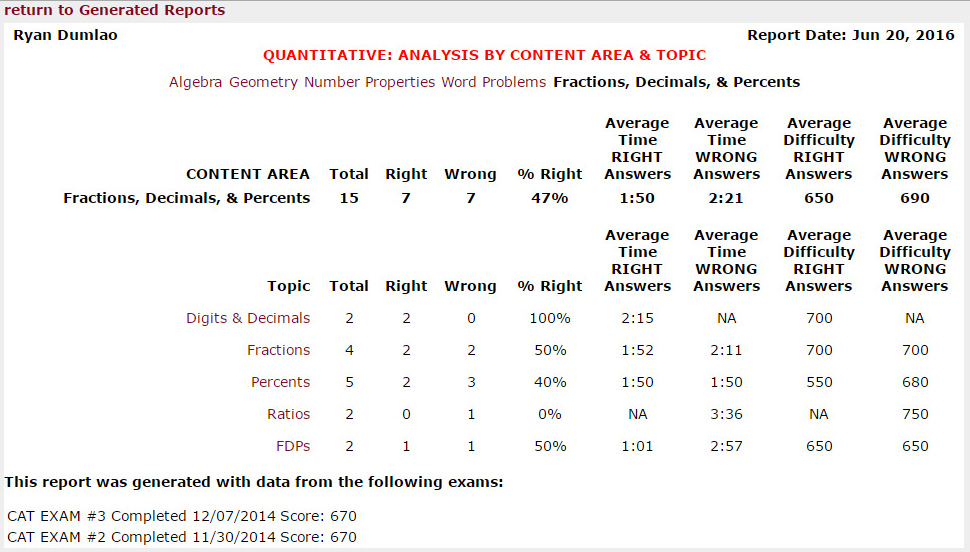 Take the chart above, for example. in Fractions, Decimals and Percents, I did horribly in Ratios and FDPs. My average times for wrong problems in those two subcats were around 3 minutes or more; moreover, the difficulty level for my wrong answers in the whole category were relatively low – 700 or below. I spent a few days poring over the strategies for these two subcats, and drilled myself on these types of problems until I felt I had a far more intuitive mental response when they popped up in front of me. I also kept a mental count in my head of how long I was spending on a problem; if I hadn’t skipped or guessed in a while, I would decide to just pick an answer and move on. The hit from a wrong answer is always better than the hit from missing questions when the test ends. I did this over two rounds of CATs, in every subcat that I felt was weak, and was able to increase the difficulty level of problems that I got right and wrong. I didn’t always get them at a better right-to-wrong ratio, but since the problem difficulties were higher, and I was spending less time on wrong problems, it was a better indicator for me that I was in a better place. 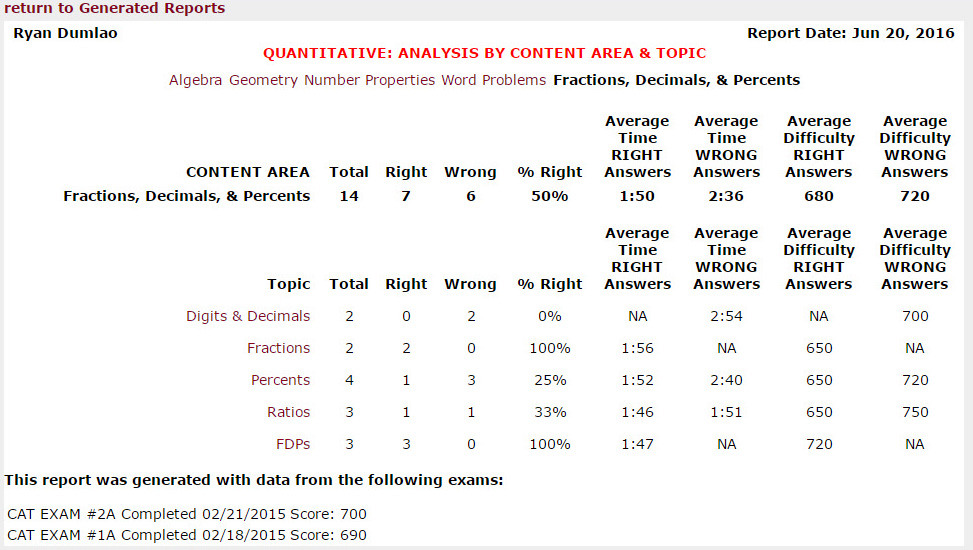 You can see from the table above the improvements in time spent as well as average difficulty on wrong answers. I concentrated on wrong answers because I felt better getting answers wrong in the 720-750 range than getting them right in the 650 – 700 range; they indicated that I was at a higher overall problem difficulty throughout the test. So just in general, you can see how targeted evaluation of your CAT performance can help push you above where you were on a baseline or first-run of the GMAT. This is probably what all the thousand-dollar courses work with you on, but since I was running at this on my own, this is what I learned was the difference between mediocre studying and truly effective studying. CAT test types Just a quick note on these practice tests – I have heard consistently around the web and on GMAT club that the Manhattan CATs are a tick harder than the actual GMAT or its official diagnostics. While my highest score on a Manhattan CAT was 700, my scores on the two free GMAT tests from the official GMAC application were 720 and 740. So take your results from these practice tests with the caveat that none are truly representative of how you’ll truly do on the test, but will give you a decent figure as to what shape you’re in. Extra Resources In addition to all this studying, I used a few Android GMAT apps to do on-the-fly GMAT problems while I commuted since I took the train to work. These were questions that I did purely in my head and helped to sharpen my response time and approach. At publication time of this article I can’t remember which ones I used (I’ll need to dig up my old phone to find them), but I’ll update this section later with what I used. In general you should be conditioning your brain to recognize and solve these problems, as well as memorizing common patterns of numbers and rules that are laid out in most test prep programs / books, anytime that you’re not actually studying or working. Get your mind into the GMAT zone and approach everything with some type of logistical, problem-solving methodology to keep your brain fresh. Redemption Test Mode 2 months later, and my chance at redemption came. After feeling far more prepared, confident and ready to go, I went about my week and days as normal. I planned a celebratory (or consolation) dinner with a friend immediately after the test to have something to look forward to. I gave myself one day of complete brain rest on Wednesday; went to work, came home, watched some TV, went to sleep a little earlier. On Thursday I woke up, went to work, and had a normal day. I left an hour early and got to the test center and jumped right into the exam, no caffeine (except my morning coffee at work), calm and alert. My mindset going in was far better than the first time. I got through IR and Verbal just fine, and then came quant. I took a deep breath, yawned to slow my heart down Apolo Ohno style, and went to task. 75 minutes later, I came out feeling far better. I hit “FINISH” and saw the screen: 710. I almost screamed out in joy at that moment, but realizing Pearson VUE would have probably kicked me out, I simply threw a silent fist in the air and called the proctor to pull me out, grinning ear to ear.  If at first you don’t succeed… Try again! And again! Really, one bad first experience should not discourage you from your true abilities. Perhaps it’s your study approach. It could be the circumstances of when you took the test. It could just be that you weren’t quite ready. But my experience showed me that a targeted study approach, calm nerves and possibly the familiarity of the process and test center that comes with a 2nd try can give you quite the bump up to what you wanted – 70 points in my case. As a side note, I had a few stumbles during the 2nd exam still, and I knew in my heart I could probably have done 10-20 points better. But I didn’t want to touch this damn test again and wanted to move on with my life and app process, so I trusted the rest of my application to carry me after this point. The GMAT is getting more and more competitive, so recognize where you feel your cut-off point is and don’t get too obsessed with your score on this exam. You have a whole application for bschool, and this is just a portion of it. Good luck!   Celebration beer, whiskey, and fried chicken |

|
|
||
|
Hi Generic [Bot],
Here are updates for you:
ANNOUNCEMENTS
Watch earlier episodes of DI series below EP1: 6 Hardest Two-Part Analysis Questions EP2: 5 Hardest Graphical Interpretation Questions
Tuck at Dartmouth
GMAT Club REWARDS
|